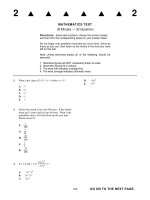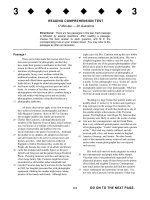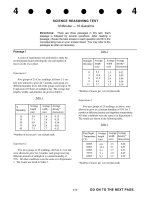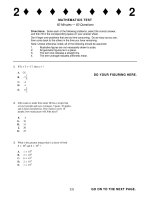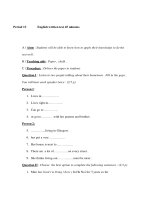ENGLISH TEST 45 minutes—75 questions
Bạn đang xem bản rút gọn của tài liệu. Xem và tải ngay bản đầy đủ của tài liệu tại đây (52.59 KB, 16 trang )
•
1
•
•
•
•
•
1
ENGLISH TEST
45 Minutes—75 questions
Directions: In the following five passages, certain
words and phrases have been underlined and
numbered.
You will find alternatives for each
underlined portion in the right-hand column. Select
the one that best expresses the idea, that makes the
statement acceptable in standard written English, or
that is phrased most consistently with the style and
tone of the entire passage. If you feel that the original
version is best, select “NO CHANGE.” You will also
find questions asking about a section of the passage
or about the entire passage. For these questions,
decide which choice gives the most appropriate
response to the given question. For each question in
the test, select the best choice and fill in the
corresponding space on the answer sheet. You may
wish to read each passage through before you begin
to answer the questions associated with it. Most
answers cannot be determined without reading
several sentences around the phrases in question.
Make sure to read far enough ahead each time you
choose an alternative.
Passage I
1.
A. NO CHANGE
B. Fish make quiet pets; they do not need to
be patted on the head or walked at 4:00
a.m.
C. Their owner who did not pat them on the
head is not worried about walking these
quiet pets at 4:00 a.m.
D. These quiet pets without a pat on the head
from their owners are not to be walked at
4:00 a.m. by necessity.
2.
F.
G.
H.
J.
NO CHANGE
which begins with
beginning with
who, beginning at
3.
A.
B.
C.
D.
NO CHANGE
keeping and possessing
keep and have
keeping
4.
F.
G.
H.
J.
NO CHANGE
breeded
breed
bred
5.
A.
B.
C.
D.
NO CHANGE
These are the ancient Romans
Yes, one can find ancient Romans which
The ancient Romans, nevertheless,
Many people enjoy the hobby of aquarium
keeping. It has several advantages. As pets they are very
1
quiet, not worrying too much about pats on the head or
1
4:00 am walks. Yet even many avid aquarists are unaware
1
of the fact that their hobby has a fascinating history.
Fish keeping actually has ancient origins, who
2
beginning with the Sumerians over 4,500 years ago. They
2
kept fishes in artificial ponds. The ancient Assyrians and
Egyptians also kept fish. In addition to keeping and having
3
fish as pets, the Chinese used them for practical purposes,
raising carp for food as early as 100 B.C. They were
probably the first people to breeds fish with any degree of
4
success. Their selective breeding of ornamental goldfish was
introduced in Japan, where the breeding of ornamental carp
was perfected. The ancient Romans kept fish for food and
5
entertainment. They were the first known seawater
aquarists, constructing ponds supplied with fresh ocean
218
GO ON TO THE NEXT PAGE.
1
•
•
•
•
•
•
1
water. The Romans were also the first to use open-air tanks
to preserve and fatten fish for market.
In seventeenth-century England, goldfish were being
6
kept in glass containers, but aquarium keeping did not
become well established until the relationship among
animals, oxygen, and plants became known a century later.
7
In the eighteenth century, France's importation of goldfish
from the Orient created a need for small aquariums. Ceramic
bowls, occasionally fitted with transparent panels, were
produced.
8
By 1850, the keeping of fish, reptiles, and amphibians
had become a useful method of study for naturalists. Philip
Gosse, a British ornithologist, first coined the term
"aquarium." The first display aquariums opened in 1853 at
Regent's Park in London, aquariums soon appeared in
9
Naples, Berlin, and Paris. The first aquarium to serve as a
financial enterprise was opened by the circus entrepreneur
P.T. Barnum at the American Museum in New York City.
By 1928, forty-five public or commercial aquariums were
open. Then it slowed, and a few new large aquariums
10
appeared until World War II. Marineland of Florida, built in
10
1956, was the first oceanarium. Flipper was a popular
11
television show about a dolphin.
11
219
GO ON TO THE NEXT PAGE.
•
1
6.
F.
G.
H.
J.
•
•
•
NO CHANGE
to have been
sometimes being
OMIT the underlined portion.
•
•
1
So next time you meet an aquarist you might
share some of this "fish trivia." For fish keeping is
12
7.
A.
B.
C.
D.
NO CHANGE
which became known
becoming known
were known almost
not only an entertaining hobby; it also has a rich and
long history, have playing a role in many diverse
13
cultures since ancient times.
8.
The purpose of the preceding sentence is to:
F. emphasize the inappropriateness of
the aquariums produced at that time.
G. illustrate the fact that the importation of
goldfish produced a corresponding need for
small containers.
H. contradict the assertion made earlier
in the paragraph that the English kept
goldfish in glass containers.
J. explain why goldfish could not live
for long in small containers.
9.
A.
B.
C.
D.
12.
10.
F. NO CHANGE
G. Then its growth having slowed; few new
large ones appeared until after World War
II.
H. Then having slowed, few new large ones
appeared until after World War II was
over.
J. Then growth slowed, and few new large
aquariums appeared until after World War
II.
11.
NO CHANGE
— fish trivia. For
“fish trivia,” and
“fish trivia! For
13.
NO CHANGE
London, which
London, where it
London, and
F.
G.
H.
J.
A.
B.
C.
D.
NO CHANGE
having played
has
had played
A. NO CHANGE
B. A popular television show about a
dolphin was Flipper.
C. (A popular television show, Flipper, was
about a dolphin.)
D. OMIT the underlined portion.
Items 14-15 pose questions about the passage as a whole.
220
GO ON TO THE NEXT PAGE.
1
14.
•
•
Which of the following best summarizes the
conclusion made by the essay as a whole?
F. The study of history is a valuable task.
G. People who keep aquariums must learn
“fish trivia.”
H. The hobby of keeping aquariums has an
intriguing past.
J. Maintaining an aquarium is a big
responsibility.
•
•
15.
•
•
The essay is made up of five paragraphs.
Which of the following is the best description
of how the paragraphs are organized?
A. First example, second example, third
example, definition, argument.
B. Introduction, earliest examples, later
examples, most recent examples,
conclusion.
C. Historical survey, first example, second
example, third example, fourth example.
D. Introduction, background information,
argument, counterargument, personal
account.
1
•
1
•
•
•
•
•
1
Passage II
16.
F.
G.
H.
J.
NO CHANGE
mobility horizontal, and vertical.
mobility; horizontal and vertical.
mobility: being horizontal and vertical.
17.
A.
B.
C.
D.
NO CHANGE
in pay and prestige.
with pay, salary and prestige.
pay in terms of salary and prestige.
18.
F.
G.
H.
J.
NO CHANGE
it’s called “vertical mobility”
they're called “vertical mobility”
it is called “vertical mobility”
19.
A.
B.
C.
D.
NO CHANGE
nonetheless
for instance
consequently
20.
F. NO CHANGE
G. In addition, it involved differing degrees
of change,
H. In addition to the fact that it involved
change's differing degrees,
J. It involves degrees of change,
The late twentieth century may well be
remembered as the Age of the "Yuppie" (young urban
professional). Our society seems obsessed with the notion
of social mobility. There are two different types of social
mobility: horizontal and vertical.
16
If there is a change in occupation, but no change in
social class, it is called "horizontal mobility." One example
of this would be a lawyer who changes law firms that are
comparable in pay and salary and prestige. A change in role
17
involving a change in social standing is called "vertical
18
mobility" and can be either upward or downward.
18
The extent of change can vary greatly. At one
pole, social mobility may affect only one member of a
society. At the other extreme, it may change the entire
social system. The Russian Revolution of 1917, therefore,
19
altered an entire class structure.
[1] In addition to involving degrees of change,
20
social mobility occurs at a variety of rates. [2] The
"American dream" is based in part on the notion of
rapid social mobility, in which an unknown individual
becomes an "overnight success." [3] One example
222
GO ON TO THE NEXT PAGE.
•
1
•
•
•
of rapid social mobility would be the young guitar
•
•
21.
A.
B.
C.
D.
22.
1
For the sake of unity and coherence, Sentence
6 should be placed:
player who becomes an instant rock star. [4] The
athlete who wins an Olympic gold medal too. [5] For
21
NO CHANGE
is another example.
is too.
OMIT the underlined portion and end with
a period.
instance, each generation in a family may be a little
better off than the generation before it. [6] Social
mobility may also be accomplished by more gradual
F.
G.
H.
J.
where it is now.
after Sentence 2.
after Sentence 4.
at the beginning of the next paragraph.
23.
A.
B.
C.
D.
NO CHANGE
in.
on.
OMIT the underlined portion and end the
sentence with a period.
24.
F.
G.
H.
J.
NO CHANGE
(Begin new paragraph) Similarly,
(Begin new paragraph) Likewise,
(Do NOT begin new paragraph) On the
other hand,
25.
A.
B.
C.
D.
NO CHANGE
they
those who are
their
26.
Suppose that at this point in the passage the
writer wanted to add more information. Which
of the following additions would be most
relevant to the paragraph?
changes. 22
The results of mobility are difficult to measure
in that. Some view large-scale mobility in a negative
23
light, claiming that it disintegrates class structure and puts
an end to meaningful traditions. Accordingly, others claim
24
that they’re attempting to rise validates and therefore
25
reinforces the class system. They see mobility as a positive
thing, enabling individuals to improve their own lives and
the lives of their families.
26
F. A discussion of the problems of the
educational system in America
G. A listing of average salaries for different
occupations
H. Some examples of the benefits of social
mobility
J. A discussion of a rock star's new video
223
GO ON TO THE NEXT PAGE.
•
1
•
•
•
•
•
27.
A.
B.
C.
D.
NO CHANGE
reinforcing, the class system; yet
reinforced. The class system; and
that it reinforces the class system
28.
F.
G.
H.
J.
NO CHANGE
(such as a flat tire)
(like the kind a flat tire gets)
OMIT the underlined portion.
29.
A.
B.
C.
D.
NO CHANGE
shows
showing
to show
30.
F. NO CHANGE
G. and there they will be for some time to
come.
H. and will be for some time to come.
J. OMIT the underlined portion and end the
sentence with a period.
31.
A.
B.
C.
D.
NO CHANGE
that being that
is
that
32.
F.
G.
H.
J.
NO CHANGE
statement’s is also one
statement is also one
statements are also among those
Still others see social mobility as destroying,
rather than reinforced — the class system yet they feel this
27
1
is a positive change. According to them, society will
benefit from the breakdown like a flat tire of a social system
28
in which material wealth is given so much importance.
Whether we view it positively or negatively, social
mobility is a basic fact of modern industrial society. The
crowd of yuppies hitting the shopping malls, credit cards in
hand, show that vertical mobility is very much with us
29
and so will a lot of other things be.
30
The following paragraphs may or may not be in the most
logical order. Each paragraph is numbered in parentheses, and
item 45 will ask you to choose the sequence of paragraph
numbers that is in the most logical order.
Passage III
[1]
The critic George Moore once said of this artist
that is "her pictures are the only pictures painted by a
31
woman that could not be destroyed without creating a blank,
a hiatus in the history of art." In part a tribute to Morisot,
Moore’s statement are also one that shows the prejudices
32
Morisot faced as a woman in a male-dominated discipline.
224
GO ON TO THE NEXT PAGE.
•
1
•
•
•
•
•
33.
A. NO CHANGE
B. showed little interest in politics and
instead took after her grandfather,
C. with little interest in it — politics —
took up after her grandfather instead
D. was little interested in it, taking after her
grandfather
34.
F.
G.
H.
J.
35.
A. NO CHANGE
B. Manet (who was neither Belgian nor
Dutch) and
C. Manet (a man not Belgian and not Dutch)
and
D. Manet — a man of neither Belgian nor
Dutch extraction, and
36.
F. NO CHANGE
G. Neither Morisot’s subject matter nor
her style is
H. Neither Morisot’s subject matter or her
style are
J. Neither Morisot’s subject matter nor her
style
37.
A.
B.
C.
D.
[2]
The Impressionist painter Berthe Morisot was born
in 1841 to a wealthy family that had connections to the
French government. Yet it was no surprise to anyone when
Morisot showed little interest in it, and instead took after
33
her grandfather, the painter Jean Honoré Fragonard. Being
33
1
34
her earliest childhood, she had the desire to be an artist. At
34
NO CHANGE
From, her being in earliest
Being in early
From her earliest
the age of twenty-one, she began seven years of study with
Corot. She had her first work accepted at the Paris Salon in
1864. In 1868 she met the Impressionist painter Edouard
Manet and served as his model for several portraits. She was
35
actively involved with the Impressionist exhibiting society
of the 1870s and 1880s.
[3]
Either Morisot’s subject matter nor her style is
36
distinctive. As a woman, she lacked the freedom enjoyed by
her male colleagues, who face no threat of social
37
disapproval in their journeys through Parisian cafes,
225
NO CHANGE
colleagues, whom faced
colleagues, who faced
colleagues, and faced
GO ON TO THE NEXT PAGE.
1
•
•
•
•
theaters, and parks. Therefore, Morisot turned her
•
•
38.
F.
G.
H.
J.
NO CHANGE
Similarly,
Likewise,
However,
39.
A.
B.
C.
D.
NO CHANGE
sphere. She began to portray
sphere insofar portraying
sphere, which were
40.
1
Paragraph 3 makes the point that Morisot's
painting did not include subject matter
available to her male colleagues. The author
wants to revise the whole paragraph to
emphasize a more positive judgment of her
work's value and a less negative view of its
limitations. Which of the following revisions
of the paragraph's first sentence would best
allow her to express this changed perspective?
38
limitations to her advantage, creating a unique vantage
point. Unlike her fellow Impressionists, who painted scenes
of Parisian night life, Morisot concentrated on her own
private sphere. Portraying women performing domestic
39
and social activities.
40
[4]
Morisot's paintings frequently feature female
members of her family, especially her daughter. She often
captures her models at thoughtful moments in their chores.
In contrast to the vast landscapes of her male colleagues,
F. While Morisot's subject matter lacks
originality, her style, in fact, is quite
suited to expressing her distinctive
interests.
G. Morisot's subject matter and style are
somewhat limited by her society's
confining standards, but her work takes
on a greater meaning in its social context.
H. Morisot's subject matter may not appear
particularly distinctive, but her work has
great meaning in its social context.
J. Few can say that Morisot is one of the
great Impressionists, but there are not
many great Impressionists in any case.
Morisot's figures are generally enclosed by some device:
41
such as a balustrade, balcony, veranda or embankment. The
41
sense of confinement conveyed by many of her paintings
may be in part a reflection of the barriers Morisot faced
as a woman artist. But despite the obstacles, Morisot
managed to achieve the recognition she deserved, helping
to ease the way for her successors the people who followed
42
after her.
42
41.
NO CHANGE
some device —
some device:
some such device such as,
42.
226
A.
B.
C.
D.
F.
G.
H.
J.
NO CHANGE
those who came after.
which followed her.
OMIT the underlined portion and end the
sentence with a period.
GO ON TO THE NEXT PAGE.
•
1
•
•
•
•
•
1
Items 43-45 refer to the passage
as a whole.
43.
The writer could best continue this essay by:
44.
A. discussing how Morisot's success
influenced social attitudes toward later
women artists.
B. comparing several Impressionist
landscape paintings by various artists.
C. providing background information on the
art critic George Moore.
D. listing, by title and author, a series of
articles on important Impressionists.
In the second paragraph, is the writer's
reference to specific dates appropriate?
F. No, because the information interferes
with the biographical purpose of this
essay.
G. No, because the information, while it
does not interfere with the biographical
purpose of the essay, is out of place since
the rest of the essay does not cite dates.
H. Yes, because the information helps to
make the story of Morisot believable.
J. Yes, because the information helps to
carry out the biographical purpose of this
essay.
45.
Choose the sequence of paragraph numbers
that will make the passage's structure most
logical.
A.
B.
C.
D.
NO CHANGE
2, 1, 3, 4
2, 3, 1, 4
3, 2, 4, 1
46.
F.
G.
H.
J.
NO CHANGE
have been replaced
were being replaced
replaced
47.
A.
B.
C.
D.
NO CHANGE
film, which is the
film: the
film known, as the
Passage IV
It used to be that when people wanted to see a
scary movie they could choose from films such as Dracula
and Frankenstein. But these classic monster movies, with
an occasional exception, has been replaced by a new breed of
46
horror film the slasher movie. It is interesting and perhaps
47
somewhat disturbing to examine what such changes in taste
may indicate about some of the values at work in our
nation.
227
GO ON TO THE NEXT PAGE.
•
1
•
•
•
•
•
1
First: commercially successful low-budget chiller
48
48.
F.
G.
H.
J.
NO CHANGE
First;
The first
First —
49.
A.
B.
C.
D.
NO CHANGE
(Place after have)
(Place after movie)
(Place after wake)
50.
F.
G.
H.
J.
NO CHANGE
The fact of the matter being
The popularity of the
Factually speaking, in terms of
popularity,
51.
A.
B.
C.
D.
NO CHANGE
— those making the films, actually
(which are the people making the films)
OMIT the underlined portion.
52.
F.
G.
H.
J.
NO CHANGE
increasing, gory,
increasingly full of gore,
increasingly gory
53.
A.
B.
C.
D.
NO CHANGE
trend:
trend —
— trend —
54.
F.
G.
H.
J.
NO CHANGE
periphery
periphery (that is, the fringe)
periphery, fringe,
was Halloween, and in its wake psycho-slasher films have
the movie market glutted. The formula for these movies
49
consists of the serial murder of teenagers by a ruthless
psychotic, with some humor thrown in. The fact of the
50
matter being that the popularity of the series of Friday the
50
Thirteenth movies and of their hundreds of silly imitators
indicates that there is a huge market for such portrayals of
random violence. Indeed, filmgoers appear to cast their votes
for more and more graphic forms of violence. As a result,
filmmakers —those who actually make the films— generate
51
increasing gory productions.
52
As a result of this trend, slasher films now
53
represent main-stream Hollywood movies. Once
limited only to the periphery (fringe) of the movie industry,
54
the exploitation of gore has become a major box office
attraction. Older slasher films, such as Psycho and The
Texas Chainsaw Massacre, actually seem like classics
in
228
GO ON TO THE NEXT PAGE.
•
1
•
•
•
comparison to the countless imitators filling video stores
•
•
55.
A.
B.
C.
D.
56.
1
Is the final sentence of this paragraph
appropriate?
and movie screens. They’re so many of these low-budget
55
NO CHANGE
They are
There's
There are
imitators in distribution that, in 1981 alone, they accounted
for half of the fifty top-grossing movies. That's a big wad of
cash!
56
F. No, because its reference to money is
irrelevant to the topic of the paragraph.
G. No, because its reference to money, while
relevant to the topic of the paragraph, is
conveyed through an inappropriate image.
H. Yes, because the exclamation with which
the sentence ends heightens the drama of
the paragraph.
J. Yes, because its specific image helps to
clarify the preceding sentence.
Although the popularity of such films has declined
somewhat as their novelty has worn off. However, they
57.
A.
B.
C.
D.
NO CHANGE
off, and they
off, so
off, they
58.
F.
G.
H.
J.
NO CHANGE
more, and more, and more violent society
increasingly violent society
increasingly violent society, full of anger,
blood and shooting
59.
A.
B.
C.
D.
NO CHANGE
public, and human
public
human's
60.
57
How can the tone and purpose of this essay
best be described?
remain a standard feature of the yearly production schedule.
Even many high-budget horror films have adopted the
slasher formula of chills and violence. Are these movies a
means of harmless fun, as some fans claim? Are they a
reflection of an increasingly and evermore violent society?
58
Or do such movies perhaps even encourage violence?
Considering the great changes both within the movie
industry and in public (human) taste, these are questions
59
we must begin to consider.
60
F. The tone is serious; the purpose is to
point out a significant change in
entertainment.
G. The tone is lighthearted; the purpose is to
recommend a new form of entertainment.
H. The tone is sarcastic; the purpose is to
show how contemporary movies lack
value.
J. The tone is harsh; the purpose is to urge
people not to attend slasher films.
229
GO ON TO THE NEXT PAGE.
1
•
•
•
•
230
•
•
1
•
1
•
•
•
•
•
Passage V
The following paragraphs may or may not be in the most
logical order. Each paragraph is numbered in parentheses,
and item 75 will ask you to choose the sequence of
paragraph numbers that is in the most logical order.
61.
A. NO CHANGE
B. unexplained disappearances, which
haven't been explained, fully.
C. unexplained disappearances.
D. unexplained disappearances that have
not been explained.
62.
F.
G.
H.
J.
63.
A. NO CHANGE
B. They’ve not transmitted distress
signals, and they've vanished forever,
never to return.
C. Transmitting no distress signals,
having vanished forever, have been
some ships.
D. Some ships have vanished forever
without transmitting any distress
signal.
64.
F.
G.
H.
J.
NO CHANGE
range to
ranging from
range from
65.
A.
B.
C.
D.
NO CHANGE
have (yet) been reached.
having yet been reached.
yet reached.
66.
F.
G.
H.
J.
NO CHANGE
region (like England)
region
England-like region
[1]
The strangest of these events all involve
unexplained disappearances — the kind that haven’t been
61
fully explained. Ships have been found abandoned and
61
62
deserted for no apparent reason. Without transmitting
62
63
NO CHANGE
abandoned
abandoned, including left
abandoned (deserted)
distress signals, some ships having vanished forever.
63
Planes have reported their position and then disappeared.
Even rescue missions are said to have vanished while
flying in the area. Theories accounting for such
occurrences ranging toward the interference of UFOs to
64
the existence of powerful fields of some unknown force.
So far, no conclusions have been reached.
65
[2]
In the North Atlantic Ocean, the Bermuda
Islands — a jumble of 300 islets, rocks, and islands
— form part of a roughly triangular region (England
66
is roughly triangular, too) whose other boundaries
66
231
1
•
1
•
•
•
are the southern U.S. coast and the Greater Antilles.
•
•
1
67.
A.
B.
C.
D.
NO CHANGE
coast (but not rivers) and
coast, but not rivers, and
coast — but not rivers — and
68.
F.
G.
H.
J.
NO CHANGE
We are those who wonder
Some wonder
Some of them are wondering
69.
A.
B.
C.
D.
NO CHANGE
has been
is
have been
70.
Is the mention of Juan de Bermudez appropriate?
67
Perhaps the first European to explore this area was Juan
de Bermudez in 1515. They who wonder whether he ever
68
experienced anything strange back then, for this is the
region known today as the Bermuda Triangle. Extremely
strange events had been frequently reported from this
69
area.
70
F. No, because it connects two dissimilar
things, exploration and the Bermuda
Triangle.
G. Yes, because it provides background
information while introducing the
main subject of the passage.
H. Yes, because the passage suggests that
exploration is more significant than
the supernatural.
J. Yes, because Juan de Bermudez is the
only person named in the passage.
[3]
Others are critical of the claims posed about the
Bermuda Triangle. They point out that wreckage has not
been found and that scientific searches have uncovered
nothing to substantiate the strange events attributed to
the region. Also, they question so it can be that boaters
71
and fliers continue to travel through the region
unharmed.
71.
A.
B.
C.
D.
72.
72
NO CHANGE
which
how
OMIT the underlined portion.
Suppose that at this point the writer wanted to add
more information. Which of the following
additions would be most relevant?
F. A geographical description of the
Bermuda Triangle
G. A brief allusion to other well-known
supernatural phenomena
H. More evidence disputing the occurrence
of supernatural forces
J. A discussion of Bermuda’s tourist trade
232
GO ON TO THE NEXT PAGE.
•
1
•
•
•
•
•
1
[4]
We may never be certain in the way a judge
73.
73
is of the truth about the Bermuda Triangle. Yet
73
A.
B.
C.
D.
NO CHANGE
absolutely certain
certain like a judge
certain as a judge is
people will continue to be intrigued by the
supernatural and the strange. One thing we can be
sure of is that this enigmatic place will continue to
fascinate the public and stir up controversy for
years to come.
Items 74-75 are based on the passage as a whole.
74.
Suppose the editor of a travel magazine had
requested that the writer give an account of
one specific disappearance that has occurred
in the Bermuda region. Does this essay
successfully fulfill that request?
75.
For the sake of unity and coherence,
Paragraph 1 should be placed:
A.
B.
C.
D.
F. Yes, because the disappearances
described are actual events.
G. Yes, because the essay focuses on
mysterious disappearances in the
Bermuda Triangle.
H. No, because the writer has relied on
generalities in discussing the nature of
disappearances in the region.
J. No, because the essay lacks factual
information of any sort.
where it is now.
after Paragraph 2.
after Paragraph 3.
after Paragraph 4.
STOP! END OF SECTION 1
DO NOT TURN TO ANY OTHER SECTION.
233




